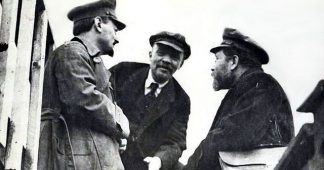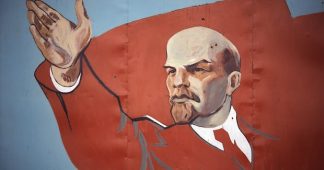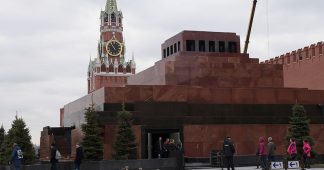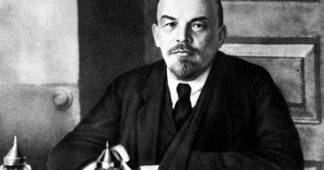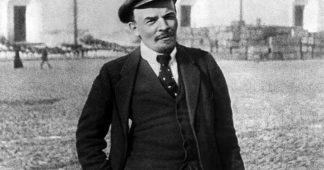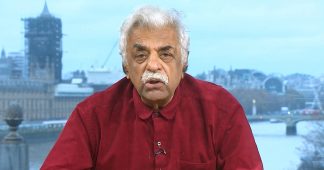A century after the Bolsheviks seized power for communism, Tariq Ali chooses some of the best books about an uprising that changed the world forever
By Tariq Ali
A hundred years after the Russian Revolution, history, according to most historians, had pronounced its judgment. October 1917 had been relegated to a past that would never be repeated, just like the tumbrils in Paris in 1793 or Charles I’s public execution outside the palace at Westminster. History doesn’t repeat itself, not even as a farce, but its echoes remain.
What I wanted to do in The Dilemmas of Lenin: Terrorism, War, Empire, Love, Revolution was to place Lenin in proper historical context as an extremely gifted political strategist and thinker who, more than any other historical figure, dominated the shape of the last century. To achieve this meant studying in detail the two streams of political thought – anarcho-terrorism and European social democracy – that Lenin absorbed and transcended to create a new synthesis.
He was neither saint nor totalitarian despot, the two roles assigned to him after his death in 1924. Hidden underneath the chaos and misery created by the horrendous civil war between the Red and White armies, (the latter backed by Britain, the US, France and their allies) there was the thread of reason.
Lenin never lost sight of this thread and in his final years, crippled by a stroke and confined to his study, he returned with vigour to denounce the failures of his own side, and insisted that if the revolution was not regularly renewed it would fail. “A Bolshevik who does not dream is a bad Bolshevik,” he would often repeat. His own dream was a state modelled on the defeated Paris Commune of 1871. This dream was the backdrop to my novel Fear of Mirrors, which I began writing soon after the fall of the Berlin Wall (and has been recently republished by Verso). In the decades that followed, the tragedies of the Revolution never completely left my mind, for October 1917 had been a formative event for my generation and its ghosts stalked the streets of Paris, Saigon and Prague in 1968.
Rereading the histories of 1917 and Lenin’s own writings without instrumentalist intent, brought back many memories and moments of discovery. Of the four works I consider indispensable, two were written by Russians and two by North Americans. All of the following works are helpful in broadening one’s understanding.
1. History of the Russian Revolution by Leon Trotsky
This passionate, partisan and beautifully written account by a major participant in the revolution, written during his exile on the isle of Prinkipo in Turkey, remains one of the best accounts of 1917. No counter-revolutionary, conservative or liberal, has been able to compete with this telling.
2. Russian Revolution 1917: A Personal Record by NN Sukhanov
This book was necessary reading for all early historians of the revolution. Sukhanov, a left-Menshevik hostile to Lenin, was actually present in Petrograd in both February and October. He is one of the few, if not the only, reliable eye witnesses who recorded Lenin’s arrival at the Finland station and then accompanied him to the Bolshevik headquarters an hour later. His self-deprecatory account of the February outbreak conveys his style of writing:
“Tuesday, 21 Feb 1917. I was sitting in my office in the Turkestan section [of the Ministry of Agriculture]. Behind a partition two typists were gossiping about food difficulties, rows in shopping queues, unrest among the women, an attempt to smash into some warehouse. ‘D’you know,’ one of these ladies suddenly declared. ‘If you ask me it’s the beginning of the revolution!’ These girls didn’t understand what a revolution was. Nor did I believe them.”
3. Ten Days That Shook the World by John Reed
A buccaneering east-coast American radical despatched to cover the revolution is hypnotised by it and his reports combined to make a book that had a huge impact in the US and beyond. Decades later, Warren Beatty made it into a movie, Reds, in which the most electrifying sections were the appearances by witnesses who had known Reed.
4. Through the Russian Revolution by Albert Rhys Williams
Williams was already in Petrograd when Reed arrived and acted as a calming tutor to his wilder and more activist colleague. His book is in some ways a more solid work, helped by several conversations with Lenin and other Bolsheviks, as well as their opponents.
5. Year One of the Russian Revolution by Victor Serge
This was Serge’s first non-literary work, composed in the late 1920s and, as he put it, “in detached fragments which could each be separately completed and sent abroad post-haste”. The book is both a testament to the popularity of the revolution and the hard necessities imposed on Red Petrograd confronted with the White counterrevolution. He was working on Year Two when he was permitted to leave Stalin’s Russia in 1936. The secret police decided to keep this manuscript and that of a complete novel, both of which disappeared from their archives.
6. The Commissariat of Enlightenment by Sheila Fitzpatrick
A riveting account of the institution that implemented the cultural and educational policies of the revolution after 1917. The Commissar was Anatole Lunacharsky, whose self-description as “a Bolshevik among intellectuals and an intellectual among Bolsheviks” was slightly exaggerated, given that the central committee was dominated by intellectuals: Lenin, Bukharin and Trotsky to name a few.
7. The Autobiography of a Sexually Emancipated Communist Woman by Alexandra Kollontai
Kollontai, a staunch opponent of the first world war, broke with moderates who supported the war and joined the Bolsheviks, becoming a vital figure in the women’s liberation movement for which she struggled throughout her life. She was the first woman ever to be appointed an ambassador to Norway and wrote: “I realised that I had thereby achieved a victory not only for myself, but for women in general … When on occasion I am told that it is truly remarkable that a woman has been appointed to such a responsible position, I always think to myself that in the final analysis … what is of a wholly special significance here is that a woman, like myself, who has settled scores with the double standard and who has never concealed it, was accepted into a caste which to this very day staunchly upholds tradition and pseudo-morality.”
8. Roots of Revolution: A History of the Populist and Socialist Movements in 19th-century Russia by Franco Venturi
Permitted access to sealed archives in Moscow that contained the documents of, and regarding, anarcho-terrorism, Venturi made good use of them. While saddened that his Soviet colleagues were barred, he produced what is a historical masterpiece on the predecessors of the Bolsheviks.
9. Towards the Flame: Empire, War and the End of Tsarist Russia by Dominic Lieven
The first chapter alone explains why the revolution was waiting to happen. A magisterial account of a decaying empire and a tsar who “created a hole in the centre of decision-making that he was unable to fill”.
10. The Tasks of the Proletariat in the Present Revolution/April Theses by Vladimir Ilyich Lenin
At times of crisis, Lenin expounded his thought in the condensed form of theses that were explicit, crisply written and concise. He hated wasting words. In the April Theses he argued the case for a socialist revolution against “Marxist orthodoxy”. It was the success of this political approach with the mass of workers that shifted a majority of the urban electorate towards the Bolsheviks. Lenin’s success globalised Marxism and The Communist Manifesto became the most published text after the Bible.
Published at www.theguardian.com
We remind our readers that publication of articles on our site does not mean that we agree with what is written. Our policy is to publish anything which we consider of interest, so as to assist our readers in forming their opinions. Sometimes we even publish articles with which we totally disagree, since we believe it is important for our readers to be informed on as wide a spectrum of views as possible.
